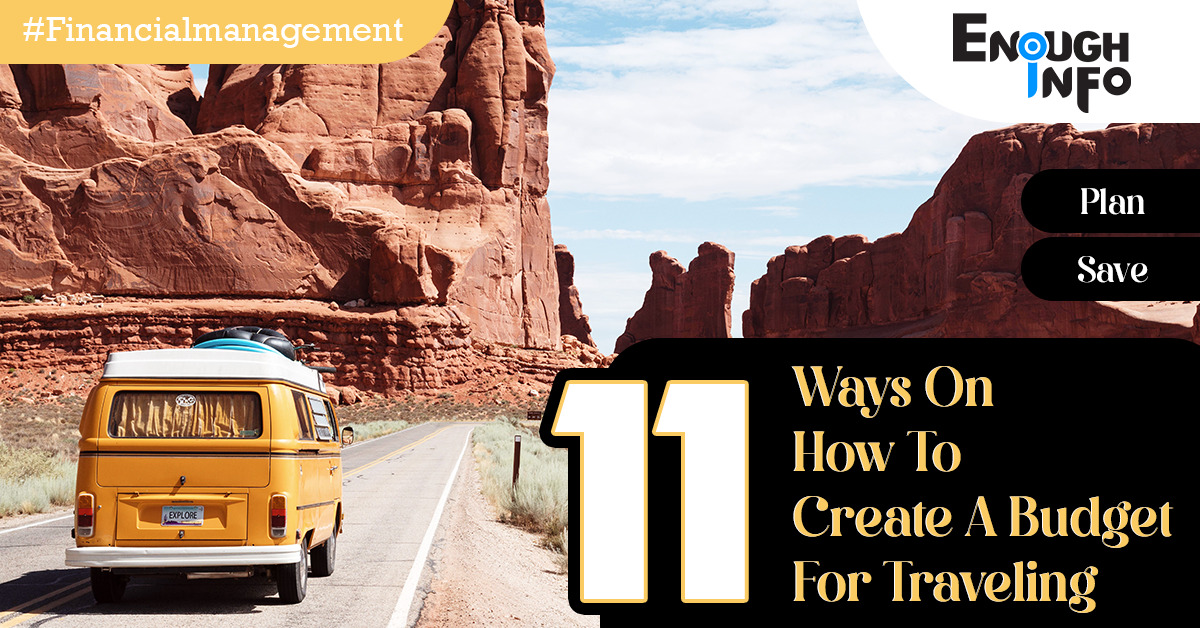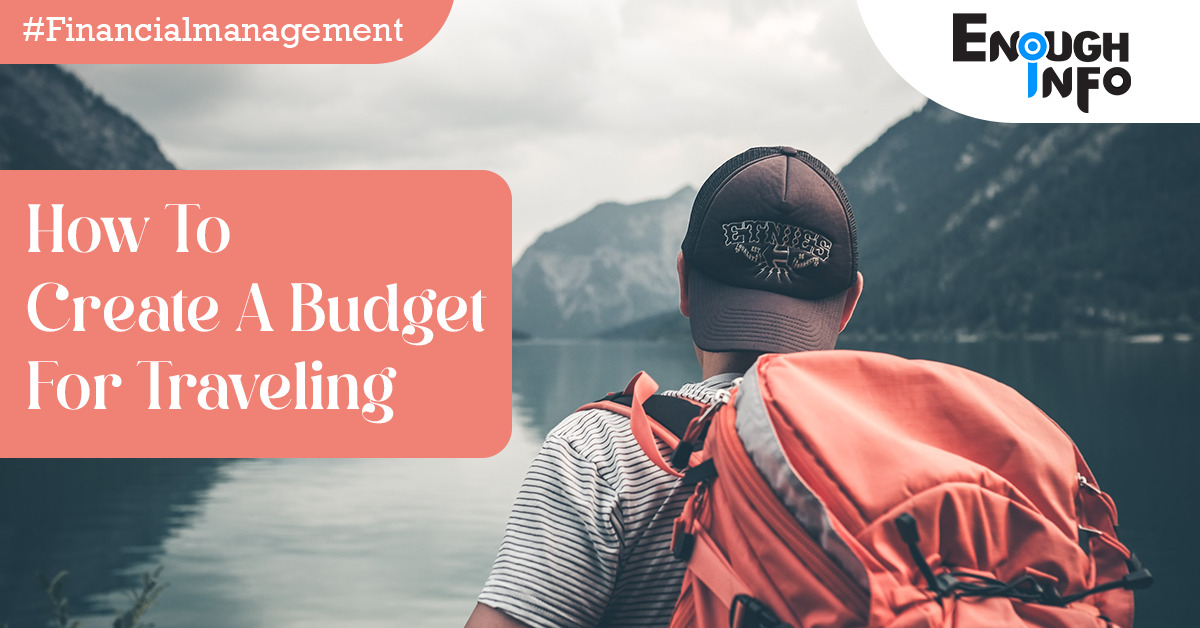
How To Create A Budget For Traveling: Traveling is an exciting and enriching experience that allows us to explore new places, and cultures, and create lasting memories. Travel budgeting is often forgotten. To maximise your vacation experience without overspending, create a budget. EnoughInfo.com

Read Also: How To Create A Budget For College Students
Creating a budget for traveling is crucial for financial planning, expense management, avoiding debt, setting goals, maintaining flexibility, and providing peace of mind. It empowers you to make informed decisions about your travel expenses and ensures that you can enjoy your trip without compromising your financial security. By taking the time to create a budget, you can have a more fulfilling and worry-free travel experience. How To Make A DIY Face Mask For Glowing Skin
In this comprehensive guide, we will walk you through the step-by-step process of creating a budget for traveling, from determining your travel goals and expenses to finding ways to save money and track your spending. With proper budgeting, you can embark on your adventures with confidence, knowing you have a clear financial plan in place.
FAQs & Answers on How To Create A Budget For Traveling
1. Why is it important to create a travel budget?
Creating a travel budget is crucial to ensure you have enough funds for your trip and to avoid overspending. It helps you plan and prioritize your expenses, making your travel experience more enjoyable and stress-free.
2. What should I consider when creating a travel budget?
Consider your destination, travel duration, accommodation, transportation, food, activities, travel insurance, and any other miscellaneous expenses. Factor in both fixed costs and variable costs.
3. How can I estimate the overall travel cost?
Research the average costs for flights, accommodation, meals, and activities at your destination. Use travel websites and apps to get an idea of the expenses involved.
4. How do I decide on a budget limit?
Set a budget limit based on your financial situation and travel preferences. Be realistic about what you can afford, and try not to overextend yourself financially.
5. What are fixed costs and variable costs in travel budgeting?
Fixed costs are expenses that remain constant, such as airfare and accommodation. Variable costs can vary day-to-day, like meals, activities, and shopping.
Read Also: How to Build Your Brand on a Budget (2023 Guide)
How To Create A Budget For Traveling

1. Set Travel Goals:
Before diving into the specifics of budgeting, it’s crucial to define your travel goals. Determine the purpose of your trip, the destinations you want to visit, the activities you wish to engage in, and the duration of your travels. This will help you estimate the overall costs and guide your budgeting process. How To Teach A Parrot To Talk
2. Research Your Destinations:
Each destination comes with its own unique cost factors, such as accommodation prices, transportation expenses, and local living costs. Conduct thorough research on your chosen destinations to gather information about the average costs of accommodation, food, transportation, attractions, and other relevant expenses. This will give you a realistic idea of what to expect and help you create a more accurate budget.
Read Also: How To Set And Achieve Meaningful Goals In Life
3. Estimate Travel Expenses:
Now that you have an idea of the costs associated with your destinations, it’s time to estimate your travel expenses. Consider the following categories: How To Play The Flute For Beginners
- Transportation: Calculate the costs of flights, train tickets, car rentals, and local transportation within each destination.
- Accommodation: Research different types of accommodation (hotels, hostels, vacation rentals) and their respective prices per night.
- Food: Estimate your daily food expenses based on the local cuisine and dining options available.
- Activities and Attractions: Consider the costs of visiting museums, attractions, tours, and engaging in activities such as adventure sports or cultural experiences. How To Clean Grout Between Tiles
- Travel Insurance: Don’t forget to include the cost of travel insurance to protect yourself against unexpected events.
- Miscellaneous Expenses: Allocate a budget for unforeseen expenses, souvenirs, and any additional costs specific to your travel plans.
4. Create a Budget Plan:
With your estimated expenses in mind, it’s time to create a budget plan. Start by setting an overall budget for your trip. Consider your personal financial situation and the amount you are comfortable spending. Then, allocate funds to different expense categories based on your research and estimates. Be realistic and ensure your expenses align with your travel goals.
5. Find Ways to Save Money:
Traveling on a budget doesn’t mean sacrificing experiences. There are several ways to save money and reduce your travel expenses:
- Transportation: Look for flight deals, use comparison websites to find affordable accommodation, consider traveling during off-peak seasons, and use public transportation or walk whenever possible.
- Accommodation: Explore budget-friendly options such as hostels, guesthouses, or vacation rentals. Consider alternative accommodations like house-sitting or couch surfing for further savings. How To Clean Grout Between Tiles
- Food: Opt for local street food or affordable eateries, cook your meals occasionally if your accommodation allows, and bring reusable water bottles to avoid buying bottled water.
- Activities and Attractions: Research free or low-cost activities, look for discounted attraction tickets, and consider exploring off-the-beaten-path destinations or local experiences that offer a more authentic and budget-friendly experience.
- Travel Insurance: While it’s tempting to skip travel insurance to save money, it’s crucial to have coverage for unexpected events that may occur during your travels. Instead of skipping travel insurance altogether, compare different insurance providers to find a policy that fits your budget while still providing adequate coverage.
Read Also: What Money Market Account Is And How It Works
6. Track Your Expenses:
Once you’re on your trip, it’s important to track your expenses to ensure you stay within your budget. Use a spreadsheet or budgeting app to record your daily expenses, including accommodation, transportation, meals, and activities. This will help you identify any overspending areas and make adjustments as needed. How To Paint A Still Life With Watercolors
7. Adjust Your Budget as You Go:
During your travels, unexpected expenses or changes in plans may arise. It’s important to be flexible and adjust your budget accordingly. If you find that you’re overspending in one category, look for ways to cut back in other areas to stay within your overall budget.
8. Monitor Currency Exchange Rates:
If you’re traveling internationally, keep an eye on currency exchange rates. Fluctuations in exchange rates can impact your budget, so it’s wise to exchange currency at favorable rates or use cost-effective payment methods like credit cards with low foreign transaction fees.
9. Be Mindful of Hidden Costs:
While you may have estimated the major expenses, don’t forget to consider hidden costs that can add up. These can include fees for luggage, visa applications, departure taxes, resort fees, and tipping customs. Research the specific hidden costs associated with your destinations to ensure they are accounted for in your budget.
10. Prioritize Experiences :
While budgeting is important, remember that travel is about experiences and creating memories. Allocate a portion of your budget to activities or experiences that are important to you. It’s okay to splurge on something that will enhance your travel experience, whether it’s a special meal, a unique excursion, or a cultural event.
11. Reflect and Learn for Future Trips:
After your trip, take some time to reflect on your budgeting experience. Assess what worked well and what could be improved for future trips. Use this knowledge to refine your budgeting skills and make more accurate estimates for your next adventures.
Read Also: How to pay off debt with a tight budget (Strategies 2023)
Conclusion on How To Create A Budget For Traveling
Creating a budget for traveling is a crucial step in ensuring a smooth and financially manageable trip. By setting travel goals, estimating expenses, creating a budget plan, finding ways to save money, and tracking your spending, you can embark on your travels with confidence, knowing you have a solid financial plan in place. Remember, budgeting doesn’t mean compromising on experiences but rather finding a balance between enjoying your journey and being mindful of your financial resources. So, start planning, create your travel budget, and embark on your adventures with peace of mind and financial freedom.
Recommended;
Budgeting: Key to Personal Finance Management
15 Common Mistakes to Avoid in Personal Finance Management
Analytics Manager Job Description




